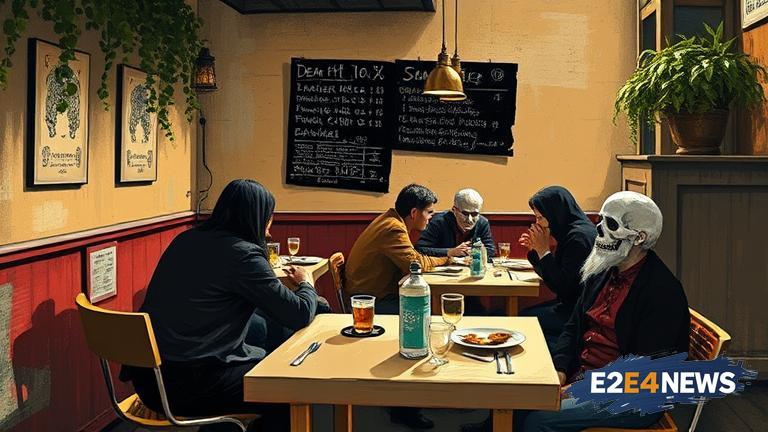Death cafes, a concept that originated in Switzerland, have been gaining ground across Europe in recent years. These cafes provide a unique space for people to gather and discuss mortality, the meaning of life, and other taboo topics. The idea behind death cafes is to create a safe and comfortable environment where people can openly discuss their fears, anxieties, and thoughts about death. By doing so, death cafes aim to help people come to terms with their own mortality and find ways to live more fulfilling lives. The first death cafe was opened in London in 2011 by Jon Underwood, who was inspired by the work of Swiss sociologist Bernard Crettaz. Since then, death cafes have popped up in cities across Europe, including Paris, Berlin, and Amsterdam. These cafes are usually hosted by volunteers who facilitate discussions and provide a supportive environment for participants. The conversations that take place in death cafes are often profound and thought-provoking, covering topics such as the afterlife, grief, and the impact of death on loved ones. Death cafes also provide a space for people to share their personal experiences and stories related to death and dying. By sharing their experiences, participants can gain a deeper understanding of the complexities of human mortality and find comfort in the fact that they are not alone in their thoughts and feelings. Death cafes have been shown to have a positive impact on people’s lives, helping them to develop a greater appreciation for life and a more nuanced understanding of death. They also provide a unique opportunity for people to connect with others who share similar interests and concerns. In addition to facilitating discussions, death cafes often host events and workshops on topics related to death and dying, such as funeral planning and end-of-life care. These events provide a valuable resource for people who are looking for information and support on these topics. Death cafes have also been recognized for their potential to help people cope with grief and bereavement. By providing a safe and supportive environment, death cafes can help people process their emotions and come to terms with their loss. Furthermore, death cafes have been shown to have a positive impact on mental health, reducing anxiety and depression in participants. The growth of death cafes across Europe is a testament to the fact that people are increasingly looking for new and innovative ways to engage with the topic of death. As the concept continues to evolve, it is likely that death cafes will become an increasingly important part of the cultural landscape. In conclusion, death cafes are a unique and valuable resource for people looking to engage with the topic of death and dying. By providing a safe and supportive environment, death cafes can help people develop a greater understanding of mortality and find ways to live more fulfilling lives. With their growing popularity across Europe, it is likely that death cafes will continue to play an important role in shaping the way we think about and engage with death. The rise of death cafes is a fascinating phenomenon that reflects a growing interest in the topic of death and dying. As people become more comfortable discussing mortality, it is likely that death cafes will become an increasingly important part of the cultural conversation. By exploring the concept of death cafes, we can gain a deeper understanding of the complexities of human mortality and the ways in which we can engage with this topic in a positive and meaningful way. Ultimately, the growth of death cafes across Europe is a testament to the fact that people are looking for new and innovative ways to engage with the topic of death, and it is likely that this trend will continue to evolve in the coming years.





